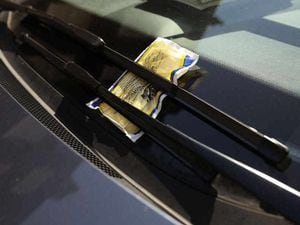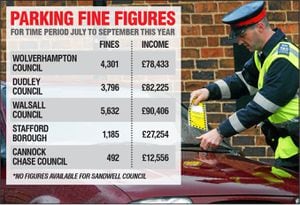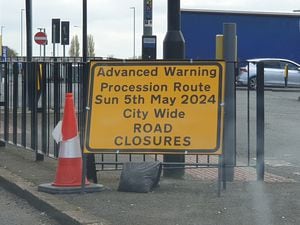Wardens clock £290k from fines in just three months - but are councils too strict on parking?
They can be seen patrolling town and city centres, ready to paste a yellow slip on the windscreen of any vehicle parked illegally.

Seen as having one of the most hated profession, the council enforcement officers play a big part in the town and city centre.
And new figures released this week reveal the extent of their work, with councils across the Black Country and Staffordshire making £290,874 from parking fines.
In the three months from July to September officers issued more than 250 parking tickets across the region, with motorists facing a £60 fine or a deduction if they pay up within 14 days.
But today community leaders welcomed the work of the enforcement officers, outlining the importance of their roles.
Councillor Karen Shakespeare, cabinet member for environmental services at Dudley Council, said: “Parking restrictions are in place across the borough and serve an important purpose in ensuring our roads are as safe and free flowing as they can be.
“If drivers ignore these restrictions or park illegally they must expect to receive a fine. Illegal parking is a persistent problem across the borough and something that residents bring to their local councillors on a daily basis looking for additional double yellow lines and enforcement action.”
She said the money received was used for the road maintenance and improving safety.
Walsall Council’s deputy leader, Councillor Lee Jeavons, said: “Any income generated from parking fines is wholly used to offset the cost of providing the service and does not supplement other services.
“I would remind drivers that compliance is the key here and rules are there for everyone’s convenience and safety.
“If there were no breaches of the parking regulations there would be no need to issue any parking tickets or provide a parking enforcement service. “
In Stafford also, the money raised is ploughed back into parking enforcement.
Asked why parking enforcement is needed, spokesman Will Conaghan said: “It regulates parking. For example managing the spaces available for short and long stay, which allows greater usage of car park spaces and therefore allows more people to come in to town to shop, for leisure or do business.”
However the figures show parking enforcement is more of a priority for some councils than in others.

A total of 5,632 fines in Walsall over the three-month period.
While in Wolverhampton and Dudley 4,301 and 3,796 were issued respectively in the same time. But in Stafford, 1,185 were handed out, and in Cannock 492.
In total, 15,406 fines were issued across the five councils – the equivalent of 257 a day. The money raised through parking in the time period across the five authorities was £290,874. Walsall Council received the most, £90,406, followed by Dudley Council, which had £82,225, and then Wolverhampton council, which received £78,433.
Stafford Borough Council received £27,254 and Cannock Chase District Council £12,556.
The figures come just two weeks after the RAC Foundation, revealed the four Black Country authorities and four Staffordshire councils brought in £4.99m over the last financial year, up from £4.75m the year before.
RAC Foundation director Steve Gooding said: “The upward path in profits is in part a reflection of the record number of cars and volume of traffic.
“The silver lining for drivers is that these surpluses must almost exclusively be ploughed back into transport and as any motorist will tell you there is no shortage of work to be done.”
In Walsall, most fines were handed out in Bridge Street and in Dudley the hotpot was Castle Street.
Wolverhampton council gave the location for the highest number of penalty charge notices, which include bus lane fines – Victoria Square.
In Stafford most notices were handed out at Doxey Road, in East Bank, and in Cannock Chase it was Anglesey Street car park in Hednesford.
The figures were obtained in a Freedom of Information request.
Figures from Sandwell Council were unavailable.





